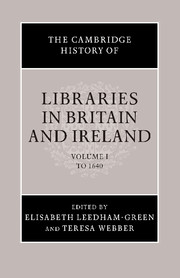Book contents
- Frontmatter
- Introduction
- The physical setting
- Part One The medieval library
- Part Two Reformation, dissolution, new learning
- Part Three Tools of the trade
- Part Four Libraries for leisure
- 21 ‘The profession of a gentleman’: books for the gentry and the nobility (c. 1560 to 1640)
- 22 Libraries of the ‘common sort’
- 23 The libraries of the antiquaries (c. 1580–1640) and the idea of a national collection
- Part Five Organisation and administration
- Select bibliography
- General index
- Index of manuscripts
- References
23 - The libraries of the antiquaries (c. 1580–1640) and the idea of a national collection
from Part Four - Libraries for leisure
Published online by Cambridge University Press: 28 March 2008
- Frontmatter
- Introduction
- The physical setting
- Part One The medieval library
- Part Two Reformation, dissolution, new learning
- Part Three Tools of the trade
- Part Four Libraries for leisure
- 21 ‘The profession of a gentleman’: books for the gentry and the nobility (c. 1560 to 1640)
- 22 Libraries of the ‘common sort’
- 23 The libraries of the antiquaries (c. 1580–1640) and the idea of a national collection
- Part Five Organisation and administration
- Select bibliography
- General index
- Index of manuscripts
- References
Summary
The libraries formed by the group of individuals known as antiquaries during the period 1580 to 1640 were of crucial importance for the long-term development of the great research collections of the modern period. They are, for this reason alone, worthy of consideration, but the study of these libraries illuminates other aspects of early modern society and culture, since the context in which they were formed, and the impact they made, impinged significantly on the political, religious, cultural and intellectual life of Britain. In order to shed light on these collections, the individuals who formed them, and the emergent concept of a national collection which they helped to develop and articulate, a number of questions arise concerning the contents of the collections, why and how they were acquired and the uses to which they were put. But before these questions are answered, we must first turn our attention to the antiquaries themselves, and what distinguished them from their contemporaries.
To be an antiquary in the period 1580 to 1640 was not be a member of a profession, or to belong to a specific sector of society, for individuals who could in some circumstances be described as antiquaries could also be described and categorised in different circumstances in other ways, such as noblemen, clerics, politicians or heralds. Although antiquity was not specifically a subject studied at university, in general antiquaries were those who engaged in the study of antiquity, defined in Renaissance Britain as not only the classical past, but the classical and medieval periods together.
- Type
- Chapter
- Information
- The Cambridge History of Libraries in Britain and Ireland , pp. 527 - 562Publisher: Cambridge University PressPrint publication year: 2006



